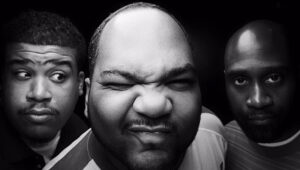 I was a little too old to be part of the Napster generation. I remember when filesharing became a thing — I’m sure I dug around the dark recesses of the internet to find a few songs at the time — but for me acquiring music inherently involved going to a store and buying an object, or maybe having someone make me a mixtape. When I hear friends even a few years younger than me talk about all the songs they accumulated by grabbing them off other people’s hard drives half a world away, I feel like they come from another universe.
I was a little too old to be part of the Napster generation. I remember when filesharing became a thing — I’m sure I dug around the dark recesses of the internet to find a few songs at the time — but for me acquiring music inherently involved going to a store and buying an object, or maybe having someone make me a mixtape. When I hear friends even a few years younger than me talk about all the songs they accumulated by grabbing them off other people’s hard drives half a world away, I feel like they come from another universe.
For many people, of course, downloading was a big enough thing that it eventually led to the more-or-less-collapse of the whole music industry. And from there, it was on to once-bizarre notions like musicians making songs available for pay-what-you-like, or even giving their entire catalog away for free. That was an offer than even a physical-object diehard like myself couldn’t pass up.
It helped that De La Soul was one of those groups I always thought I should be listening to. I’ve always tended toward doing deep dives into a few musicians more than expanding out broadly, and my early rap experiences were no exception: There was likely a point where I had every Boogie Down Productions and Public Enemy album and no other hiphop at all. By the turn of the ’90s, though, I was starting to look to branch out, and had read (in the Village Voice, most likely) about Native Tongues, the New York–based loose collective of artists that was starting to gain a name for itself. And while De La Soul wasn’t my favorite from the collective — that would have been Monie Love, who I thought blew everyone else out of the water, including her more famous sometime collaborator Queen Latifah — they couldn’t help but be on my radar, especially after their debut album 3 Feet High and Rising won the Voice’s Pazz and Jop awards in a runaway.
Still, I didn’t go out and nibuy it. I also didn’t buy De La Soul Is Dead, or Buhloone Mindstate, or any of the De La Soul albums that followed. Rap production styles gradually shifted away from the dense sonic soundscapes of the early ’90s to the more straightforward beats and samples of the post-gangsta era — in large part thanks to changes in copyright practice, possibly the biggest influence of intellectual property laws on culture outside of the Marvel universe — and MTV started showing reality shows instead of videos, and I lost track of what was new in hiphop, or even old.
Until I saw that note about free De La Soul downloads in 2014, anyway. At which point I grabbed them all, dropped them all into iTunes, and … mostly forgot about them.
Having to write this entry has had me trying to puzzle out why. I certainly don’t dislike De La Soul — there have been a bunch of times one of their songs has popped up on the radio or on iTunes shuffle and I’ve been grabbed enough by it to check the playlist to see who it was by. But I still tend to listen to music the same way I did in my formative years when it was all on vinyl or CDs: Put on an album, listen to the end, put on another album, repeat. And for whatever reason — no specific positive associations, no album covers or liner notes to get me thinking “I should listen to that again” — I haven’t dialed up any of those free downloads very often.
While I was puzzling over how to finish this post, WFMU’s Michael Shelley Show played a weird spoken-word song by rock critic Gene Sculatti called “What Is A Rock Critic?”, which patched together hilarious excerpts from New Yorker music reviews that included the line: “Rock critics save their highest praise for records like De La Soul’s debut, which ‘imbued hip hop’s sample-based aesthetic with a cheeky intentionality.'” Was that it? Was I somehow turned off by an element of their music that appealed to pointy-headed spewers of rock-crit verbiage? Or at least turned off by the verbiage itself, to where De La Soul ended up excluded from entry onto my deep-dive list? Were they too jazzy, too lite-clever, too something?
It doesn’t matter, really. This project — the blog one, I mean, but I suppose examining one’s own musical tastes at all — ultimately isn’t about trying to talk myself into listening to things, but explaining why I do or don’t, and sometimes there is no explanation other than “I like what I like.” (Why I sometimes start to like what I formerly didn’t like is an even bigger puzzler.) I admit, I’m tempted to give 3 Feet High and Rising a long listen now that I’ve spent so much time thinking about why I haven’t listened to it more, but — hmm, I wonder what Monie Love is up to these days?